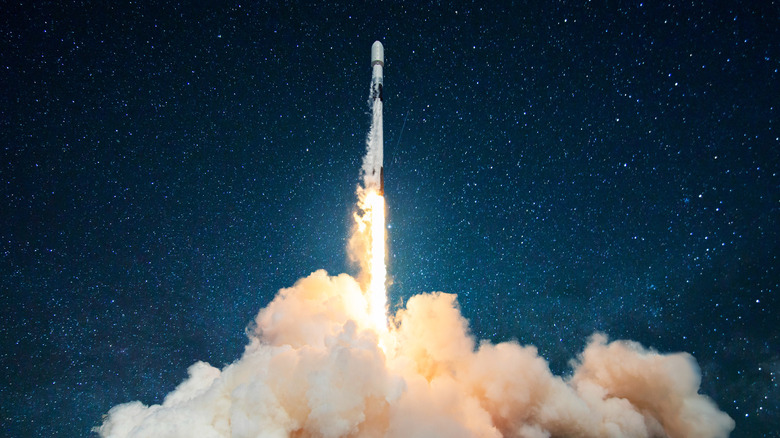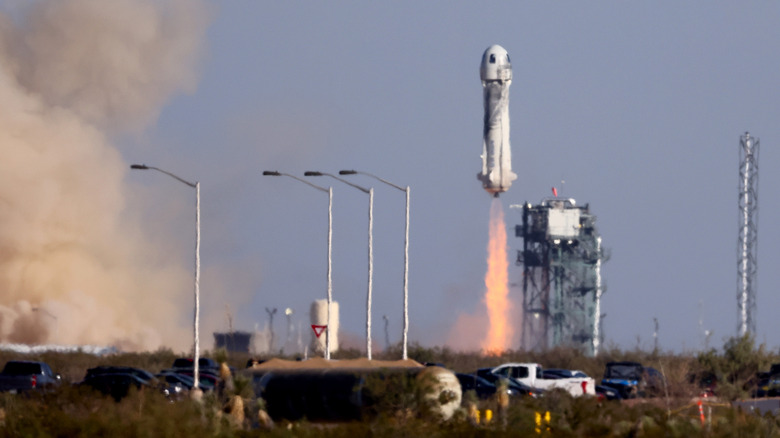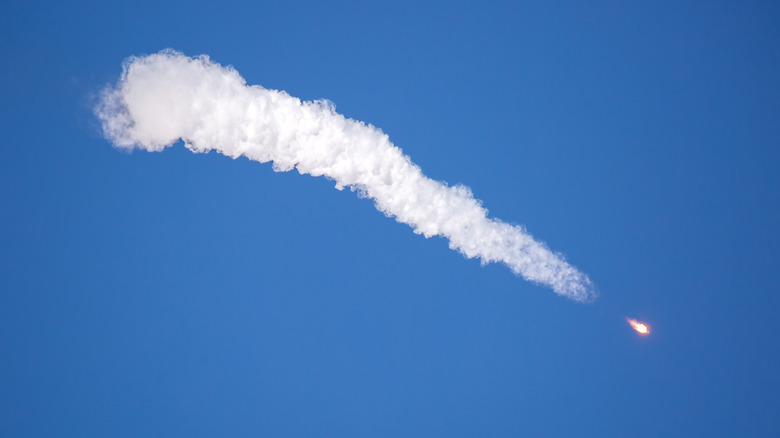The Odds Of Being Crushed By A Rocket Has People Talking
Being eaten by a shark, struck by lightning, or kicked to death by a donkey are all very unlikely — but still possible — ways to die. Now you can add "crushed by a falling rocket" to the list of outlandish deaths that are probably more likely than a Mega Millions win.
The chance of picking up a Mega Millions jackpot is more than 300 million to one. While your odds of being hit by lightning are over 300 times greater than that, the CDC claims that close to 90% of lightning strike victims survive their ordeal. Florida Museum says that your odds of spending the final moments of your life in a shark's mouth stand at over 4,300,000 to one, while — despite a common myth designed to make people feel better about air travel — the chances of a donkey hoofing you to death are actually unknown (via Snopes).
So what about objects falling from the sky? The chances of a meteorite killing you are far lower than you think. Wired has the number at around one in 250,000 — four times more likely than being hit by lightning. Bits of space rock killing people isn't new; scientists believe one of humanity's first settlements was destroyed by a meteor strike close to 13,000 years ago. What is new is the possibility of a falling rocket killing you. Escaping Earth requires a lot of energy, so engineers tend to attach rocket boosters to objects they're trying to get into space. These boosters provide a lot of the initial thrust needed to escape Earth's gravity before detaching and falling back towards the planet. Usually, they land in the sea or in an area scientists have determined to be safe, but that isn't always the case (via Green Matters).
We've been launching things into orbit for over 60 years
Space itself is bigger than we can currently measure and, obviously, isn't going to be filled by the debris we manage to launch from Earth. However, the bit of space that surrounds our planet is beginning to get quite crowded. Humanity launched the first man-made object into space back in 1957. The Soviet Union's satellite, Sputnik, beat the American Vanguard rocket into space by a year. In 1961, the Soviets put the first man into space, a pilot by the name of Yuri Gagarin. Then in 1969, three men landed on the moon and two of them, Neil Armstrong and Buzz Aldrin, walked around on the lunar surface (via National Geographic).
All of these launches — and the test launches in between — were major achievements and symbols of humanity's scientific advancement. Now, throwing stuff into space is incredibly common and central to modern life. The internet, GPS, your cell phone, and even older tech like TVs all benefit from the thousands of satellites whizzing around above our heads. With that said, all of the equipment had to be launched up there, it all has a finite lifespan and will need to be replaced one day, and the number of objects already orbiting our planet is beginning to cause significant issues. Still, the number of rockets blasting off is only increasing.
Space is getting crowded
Last year saw 135 successful launches, which New Scientist says is the most in history. All of those launches will have used booster rockets, and all of those booster rockets will have come tumbling back to Earth. Objects that make it into space can also come back down, and not all of them burn up on re-entry. In addition to national space programs, which used to be limited to just the U.S. and U.S.S.R. but now involve over 12 countries, private capital is launching a lot of rockets. Space-obsessed entrepreneur Elon Musk is already a big contributor, and his role is set to grow as time goes on.
The world's richest man famously has a space-based rivalry with fellow billionaire and former world's richest man Jeff Bezos, though Bezos' effort is mainly focused on space tourism. Amongst the high-profile private space flights that have already taken place is one that saw both Jeff Bezos and William Shatner — famous for playing Captain Kirk in Star Trek — briefly blast off into space. Companies like Bezos' Blue Origin and Richard Branson's Virgin Galactic mean we could soon see more debris falling to Earth due to ultra-rich society's recreational space adventures.
Musk's company SpaceX has also dabbled in space tourism but is probably more famous for the number of NASA contracts it lands and its owner's obsession with colonizing Mars. The world's richest man also heads a satellite-based internet company called Starlink. While Starlink is providing a necessary service and is arguably the most practical way to make ultra-fast internet available worldwide, it does involve a lot of satellites. Thousands have been launched so far, and thousands more are planned. Starlink has received the go-ahead from the FCC to put up to 40,000 satellites in low-Earth orbit.
There's a chance of someone being hit by a falling rocket soon
According to a study published in Nature Astronomy, there's a 1-in-10 chance someone will be hit by a piece of falling rocket debris within the next decade. The study claims that most launches result in uncontrolled re-entries, and those re-entries put people, property, ships, and planes at risk. Given that there are over 7 billion people on Earth, the chances of the unlucky individual being you or someone you personally know are still drastically slim — but a piece of falling space waste killing a human somewhere is a realistic possibility, and that is a major issue.
The risk is also heightened in the global south, with Africa and India more likely to be on the receiving end of some errant debris than North America or Europe. Countries in this region tend to be less affluent, and aside from notable exceptions like India, are unlikely to have space programs. The researchers, therefore, accuse more affluent countries — which would include the United States — of "exporting the risk" of a falling rocket-based disaster to these nations. The chances of a falling booster killing a person could be reduced by simply launching fewer rockets, but that is unlikely to happen.
Rocket scientists do their best to calculate where jettisoned rocket parts are going to land, and make sure that landing is somewhere safe. Two-thirds of the planet is covered by oceans, and those oceans are usually the biggest and safest target, but things don't always go to plan. Last year, the world sat on edge as a 100-foot-long stray Chinese rocket made an uncontrolled re-entry before crashing into the island of Borneo.



